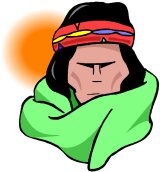Monday Reading COMP
|
Native American Rights Day By Mary Lynn Bushong |

|
 1 What
are your rights? Do you know? Most countries have the rights of
their people spelled out in their constitution. This was not
always so.
1 What
are your rights? Do you know? Most countries have the rights of
their people spelled out in their constitution. This was not
always so.
2 When
America was first colonized, there were people already living
here. Many of the colonists acted like the native people were not
even human. The people did not live like the colonists did.
3 When
the Spanish first came to the Americas, they looked for riches.
Their interest in the people was in how they could be used to
gain wealth. The religion of the Spanish did not give the native
people a choice to practice their own beliefs. The only choice
they were given was change or die.
4 The
French were a little better, but they were not so anxious to have
colonies. They treated the Native Americans more equally in
trade. Their traders often intermarried with native families to
make the ties between them stronger. Even so, they were not above
being unjust to get what they wanted.
5 The
other main group of colonists to the Americas was the British.
They often suffered from a bad case of pride which affected their
relationships with native people.
6 The
settlement of Jamestown started badly for this reason. The
colonists assumed they could just take the land which was already
being used by local natives. Even with treaties, the colonists
often broke their side of the treaty. Their actions show that
they did not think Native Americans had rights even in their own
country.
7 The
same was not true further north where Plymouth was established.
Those colonists knew that they were in debt to the native people.
They became friends based on the idea that they were all equals.
They built on land that was not used by any tribe and asked
permission to do so. When they signed a treaty, it was for
everyone's mutual benefit. That treaty was honored for more than
fifty years until the original signers were dead. By then pride
had overtaken many of the colonists.
8 All
over America, treaties protecting the rights and property of
Native Americans were few and far between. The native people were
in the way of colonists' thirst for more land. When natives tried
to fight back, they were often crushed.
9 In
the case of the Iroquois, things went a little differently. They
were never conquered as a people and kept their rights as a
sovereign nation. This included the right to make treaties with
other countries and to rule themselves.
10 Many
of the other native nations were pushed into reservations in the
west. Treaties were constantly being made and broken. The native
people were made to feel ashamed of their heritage for the
"crime" of being different from their neighbors.
11 Many
of the Native Americans who lived on the reservations had little
money, little education, and less hope. Their cultures and native
languages were left to die out under the burden of drug and
alcohol abuse.
12 During
World War II, some Native Americans regained some of their pride.
Navajo code talkers used their language as the basis of a code
that could not be broken. Others were honored for their bravery
and sacrifice in battle.
13 The
native people realized that the obligations of the federal
government had never been met. They might have been a conquered
people, but they still had rights.
14 In
1969, native activists took over Alcatraz Island. Their actions
brought media attention to native rights and the plight of their
people. A group called AIM (American Indian Movement) was formed
to safeguard those civil rights.
15 The
federal government took notice. It changed its official policy
from destruction of the native cultures to allowing them tribal
self-rule. Congress also passed 52 proposals to help them
establish tribal rule. Then they increased funding for health and
education.
16 Since
then, there has been a return in many areas of Native American
culture; art, language, history, and their way of life. Those who
once had their rights trampled, raised up their eyes and found
they had power. By valuing their own culture, they are valued by
others. They have regained much of their sovereignty, firmly
taking back rights that should never have been lost in the first
place.
Copyright © 2013
edHelper
| Name _____________________________ |

|
Date ___________________ |
|
|
||||
|
|
||||
|
|
||||
|
|
